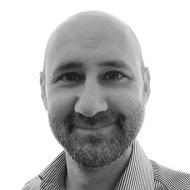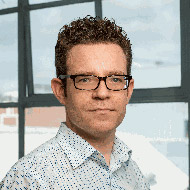Paddy Pope is the Energy and Carbon Manager at the Bank of England, where he is responsible for managing the Bank’s energy use and carbon emissions from an operational perspective. This translates into a wide and varied workload, with responsibilities including developing and implementing the Bank’s carbon strategy and targets, working closely with the procurement team to select energy suppliers, and finding new ways for the Bank to save energy, whether by optimizing control strategies, changing heating systems or installing new equipment. There are also some unusual challenges involved in working in a Grade I listed building – the Bank of England’s headquarters in London – requiring innovative solutions to deliver energy savings and improved performance within the constraints of listed status.
He has recently taken the lead in developing ambitious and evidence-based new carbon targets for the organisation. To do this, he developed an approach informed by the Science Based Targets methodology and calculated a target of a 63% cut in emissions by 2030. He notes that the technical work involved in developing the target was interesting, however the real challenge was gaining buy-in at a high level within the organisation and seeing the proposed targets through the governance process. By working closely with the key stakeholders and decision makers, explaining the plan clearly and addressing concerns early on, the team were able to secure the backing of the Governors in setting this important target.
After studying for a degree in Mechanical Engineering, Paddy worked as an Energy Consultant in both Manchester and London, including a large volume of international work helping clients to save energy, use energy more effectively and cut down on emissions. Whilst working with IKEA, he was involved in the development of a cutting edge, zero carbon heating strategy. This involved assessing the state-of-the-art in zero carbon heating via workshops with key IKEA staff in various regions around the world, helping to bring to the fore the main issues, constraints, and challenges. Of the work, Paddy notes “synthesizing an overarching plan out of all this input was a great team effort, and ultimately rather exhilarating. To see IKEA now putting it into action is very satisfying, particularly as they drive down their absolute carbon emissions.”
Looking to the future, he acknowledges that managing energy effectively is becoming driven by large volumes of data, with increasing coverage of sub-metering and export of data from building management systems. In addition to developing his analytical skills with large datasets, he is keen to keep on learning and, where possible, implement new technologies to drive changes in energy use and carbon emissions. In the longer term, he hopes to make an impact on the Bank of England’s carbon footprint; continuing the journey towards cutting the organisation’s operational carbon emissions and driving change within the organisation, with the ultimate aim of reaching and exceeding the carbon targets.
Paddy is a Full Member of the IES and in 2018, achieved Chartered Environmentalist status. He is also a Chartered Energy Engineer and Chartered Energy Manager.
“I’ve found that the chartered qualifications help to provide an additional level of assurance and authority to my work. In particular, they demonstrate that I have a good level of understanding of the energy and sustainability fields, and how these impact on the wider world.”




